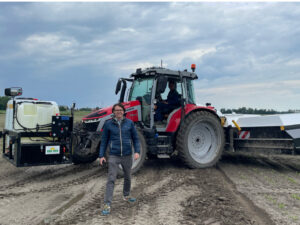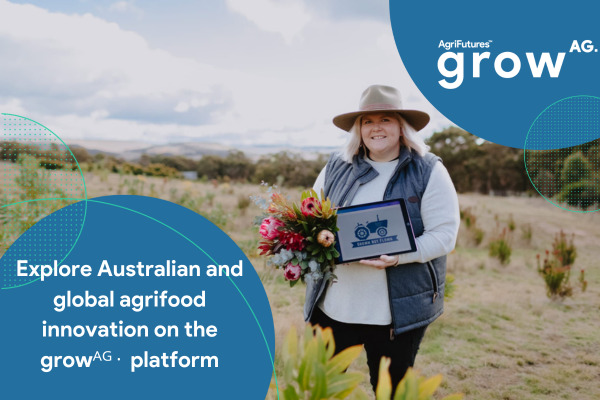After the agriculture technology (AgTech) sector raised a total of $2.36 billion in 2014, the big question was whether or not the sector would continue to pick up momentum in 2015. Judging by first quarter performance, we’re feeling optimistic. Q1 came in with over $1 billion disclosed investment dollars across 79 deals—a 122 percent jump from Q1 last year, with a 44 percent increase in deal volume.
Many of the trends from 2014 have continued in 2015 thus far—such as bioenergy ($155.6 million), decision support technologies ($112.5 million), and drones and robotics ($97.7 million) pulling lots of capital. Let’s take a look at the highlights:
New money flowed to AgTech
In the first quarter of 2015, Finistere Ventures announced the launch of its $150M FVII Fund, and The Andersons, a public company acting across the agriculture value chain, created a new venture capital arm, Maumee Ventures. Ag-focused Paine & Partners unleashed a huge $893 million Private Equity Fund that will be allocating a portion of its investment to AgTech.
In light of cannabis restrictions slowly lifting on a state-by-state basis, the budding marijuana industry received some interesting attention. Snoop Dogg announced his intention to raise a $25 million fund, Casa Verde Capital, and Founders Fund invested in Privateer Holdings‘ $75 million fund, which previously backed Leafy, known as the Yelp for marijuana dispensaries and strains.
In Q1, we tracked a total of 105 unique investors funding Ag and AgTech-related companies. The Yield Lab was the most active investor, writing five $100,000 checks for its new accelerator class. Data Collective, which just recently raised its third fund ($125M) for big data, was the next most prolific, investing in three big data ag plays. Notably, 77 investors from this quarter were not captured in our 2014 investment report. Since investors often remain undisclosed this doesn’t come as a surprise, but it could signal new money circling the ag industry.
Water technology, satellite, and food allergy service companies were the biggest individual earners
Netafim—an Israeli company that helped popularize drip irrigation systems back in the mid-‘60s, and remains one of the largest irrigation technology suppliers in the world—closed a $500 million debt financing deal (Israel Discount Bank, Union Bank of Israel, Migdal Insurance and Financial Holdings, Mizrahi Tefahot Bank, and HSBC) in March, accounting for nearly half of Q1’s funding. The half-billion financing will reportedly be directed towards strategic growth opportunities, including micro-irrigation projects in developing regions like China and India, and new product development. Separately, in the U.S., we expect increasing market interest in smart irrigation and resource management as Western states continue to combat a historic drought.
Micro-satellite developer Planet Labs closed $95M in January: a $25 million debt financing from Western Technology and $70 million from 13 VC firms, including Lux Capital, AME Cloud Ventures, and First Round (note: that number rose to $118M with an additional $23M coming in from IFC in early April). Then in March, Allergen Research Corporation, which develops treatments for accidental food allergy exposure in children, raised $80 million in a Series B, funded by RA Capital Management, Adage Capital Management, Aisling Capital, Fidelity Management & Research, Longitude Capital, and Foresite Capital.
Seventy five percent of Q1 deals were Seed and Series A
As with 2014, investors continued to jumpstart early-stage AgTech companies. $12 million was funneled into 35 seed rounds, with e-commerce, marijuana startups, and data-analytics systems leading the pack.
GrubMarket took in the most seed capital in Q1, with $2.1 million funded by NewGen Venture Partners, Y Combinator, Jerry Yang, and GGV Capital. Founded in February 2014, the California-based company is working to connect local farmers and buyers through its delivery service. Following closely behind was smart marijuana company Potbotics ($2 million; undisclosed) and food database Edamam ($1.9 million; Sam Inkinen, Bogomil Balkansky, Andrew Malik, James C. Momtazee, Wei Hopeman, and Brad Zions).
We also saw new companies emerge with clever solutions for cultivating plants with less available resources. Washington-based To Soil Less raised $60,000 in equity crowdfunding for its gravel gardening concept in January. The company claims that by planting gardens in nutrient-rich sedimentary rocks with minimal water, gardeners can eliminate the need for fertilizers and cut down water use. In March, a Finnish startup called Innovesi raised an undisclosed amount in a seed round for its smart water grid management system. Combining hardware and software, the company claims it’s trying to bring “water management to the 21st Century.”
For Series A, $150 million was raised across 24 deals. Major investments included “waste-to-energy” company Blue Sphere ($27 million; York Capital Management), UAV-helicopter developer Pulse Aerospace ($21.2 million; undisclosed), and customizable food supplement company Soylent ($20 million; David Friedberg, Index ventures, Leper Hippeau Ventures, and Andreessen Horowitz).
Drones continued to soar
The Association for Unmanned Vehicle Systems International estimates that the drone market will reach $140 billion over the next decade, and 80 percent of that market is projected to hover closely around precision agriculture. When the FAA released a proposal to amend rules for commercial drone use in February, those predictions are a step closer to reality. And if the funding bonanza from Q1 is an indication, VCs see lots of untapped potential the technology.
$50 million was invested into open-source drone developer 3D Robotics, which counts agriculture as key early market opportunity. Shea Ventures, Mayfield Fund, OATV, True Ventures, Foundry Group, and Qualcomm invested in the Series C round.
When it comes to drones, hardware is only one side of the coin—in order to help users reach new heights in efficient farming, drones are often best paired with data crunching software. DroneDeploy, a drone management platform, brought in $9 million in Series A funding in March. The company, which has raised a total of $11 million since launch, recently partnered with the aforementioned 3D Robotics and AgEagle. The latter develops drones exclusively for the agriculture industry.
The bioenergy subsector was a VC favorite again
Back in January, Green Biologics kicked off the new year by closing on $76 million in two rounds—a $34 million debt financing by Tennenbaum Capital Partners and a $42 million Series C by Swire Pacific Limited and Sofinnova Partners. The company works to produce renewable fuel from feedstock.
That same month, Edeniq, a biorefining company, secured a $16 million in a Series F. Backed by I2BF Global Ventures, the funding will support the company’s PATHWAY platform, which is said to increase ethanol yield production up to 6 percent during feedstock conversion. And a few weeks prior, ethanol-producer Agrivida landed a Series D financing, with Cultivian Sandbox Ventures as the primary backer.
M&A activity
Several exits appear to be on the horizon this year, as some of the larger ag players earmark funds for acquisitions and as some of the larger agtech companies swallow up-and-comers. In Q1, as we noted in our M&A discussion in Agtech is the New Queen of Green, Farmers Edge, fresh off a Series B from Kleiner Perkins, acquired GranDuke Geomatics. To kick off Q2, Granular, which itself sold off part of its assets (soil testing) to Monsanto last year and changed it’s name to Granular, has just announced its acquisition of AcreValue, a two-year old company formed by former Google and Climate Corp alum, that’s on a mission to bring Zillow-like transparency to farmland.
Have news or tips? Email [email protected].

















Sponsored
Sponsored post: The innovator’s dilemma: why agbioscience innovation must focus on the farmer first